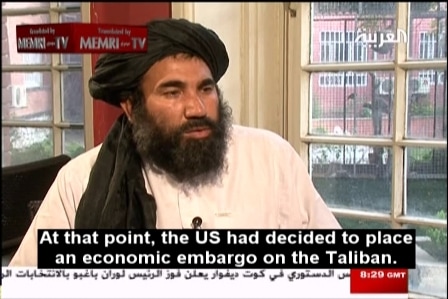The following are excerpts from an interview with Abdul Salam Zaeef, former Taliban ambassador to Pakistan, which aired on Al-Arabiya TV on December 3, 2010.
To view this clip on MEMRI TV, visit http://www.memri.org/legacy/clip/0/0/0/0/0/0/2736.

"[The Taliban] were Not Defending Anybody's Crime, but Rather We were Defending [Afghanistan's] Independence, as a Religious Responsibility"
Abdul Salam Zaeef: "It is true that there were problems in Afghanistan, which began in 2000 and intensified in 2001. At that point, the U.S. had decided to place an economic embargo on the Taliban. The UN had also decided to impose an embargo, under pressure of the U.S. It also froze the assets of Afghanistan abroad. There were problems, and the Americans were demanding that Osama bin Laden and his comrades be handed over. Saudi Arabia and Pakistan were also exerting efforts in order to have bin Laden handed over.
"Several UN delegations decided to visit Afghanistan. I met with Kofi Annan in those days, but all those meetings and contacts were characterized by the arrogance of [the other] party. They did not present reasonable plans or demands. They insisted that Osama bin Laden be handed over to the U.S. At that time, we presented three proposals to resolve the problem. I personally exerted many efforts in an attempt to resolve the problem. I presented these proposals to the U.S., through the U.S. embassy in Islamabad, and we discussed the matter.
SUPPORT OUR WORK

"The first proposal dealt with the need for them to understand the Afghan traditions and culture. We were not defending anybody's crime, but rather we were defending the country's independence, as a religious responsibility. But the Americans were not willing to accept these proposals. In addition, Afghanistan and the U.S. did not have an extradition agreement. They wanted nothing less than to have Osama bin Laden handed over to them. Our proposal was that if they presented sufficient evidence implicating bin Laden, he would face a fair trial in Afghanistan.
"We told them several times, when we met, that this proposal was a feasible one. But the American delegation did not visit Kandahar. The Taliban had serious intentions, and wanted to take a step towards them, but because of the American arrogance, and because of its refusal to recognize the Islamic Emirate, the U.S. refused to conduct a dialogue, and persisted that Osama Bin Laden be handed over to them, completely disregarding the proper ways to resolve the issue." […]
Interviewer: "Don't you think that the Taliban made a mistake by harboring bin Laden? What is your view today, after all the years that have passed, and the tragedies that have been befallen Afghanistan in the past nine years?"
Abdul Salam Zaeef: "I do not accept the claim that we made a mistake, although anybody can make an error. We were right, because we were defending our independence and our customs." […]
"The Attitude [at Guantanamo] was Inhumane and Even Unworthy of Animals"
Abdul Salam Zaeef: "Guantanamo prison was not [just] a prison, but a manifestation of political arrogance and a place to amass hostages. The attitude there was inhumane and even unworthy of animals. It was based on deriving benefit from the detainees in Guantanamo. They would torture us in an attempt to gather information violently, in order to obtain evidence to present to the American people and the world, so they could justify their attacking of Afghanistan.
"Another goal of Guantanamo was to intimidate those who are behind [sic] the U.S. The third goal was to send messages to other countries, because the Americans consider the UN and its laws to be of no importance. Whenever we asked for anything from the Americans, they would say: 'You deserve nothing from us because you are terrorists. Whatever we give you is a gift, from the goodness of our hearts.' Official UN and Afghan representatives were not permitted to visit that prison." […]
"Being in This Region is Difficult for the Americans, and This is Their Greatest Mistake"
Abdul Salam Zaeef: "Many problems combined to give rise to the current situation. When the U.S. was preparing to enter Afghanistan, I sent them a message warning them, in several ways, not to do so, and saying that a war in Afghanistan would not be a simple mission. True, gaining control is easy, but remaining here is very difficult. From the very beginning, the mistake was for the U.S. to come to Afghanistan, and this only intensified when the Bonn Conference made another mistake, by deciding to send the NATO forces and give them control of Afghanistan.
"Another mistake was to trade in the lives of the Taliban members: arresting people, killing them, raiding the homes of the Taliban members, attacking people and intimidating them, while hunting for the Taliban.
"Their continued presence in Afghanistan throughout this period is another great mistake of theirs. The very presence of the Americans in Afghanistan is a great problem. Afghanistan and the region in general cannot tolerate the U.S. There are vipers in this region – China, Iran, Russia, Pakistan, and India, which are nuclear powers.
"Being in this region is difficult for the Americans, and this is their greatest mistake. If they want to remain in Afghanistan and to resolve the problem, they must, first of all, put an end to the war in Afghanistan. Today, the war is against the people, not against the Taliban. What [the foreign forces] did in Afghanistan is a violation of the Afghan people's values, beliefs, and independence, and inhumane treatment of the people. They became intoxicated with power. I believe that all this has caused the Afghan people to abhor them even more, but instead of overcoming these mistakes, they merely augment and expand them. They continue to fight, to bomb, to kill people, and to arrest them, and this automatically strengthens the Taliban." […]



